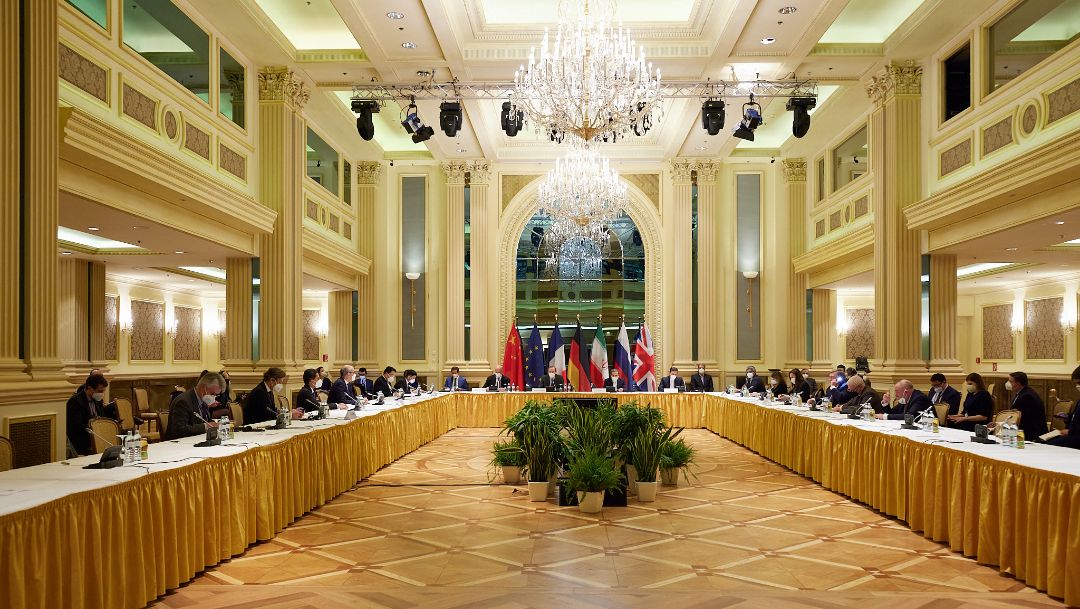WASHINGTON (JTA) — Joe Biden’s Iran deal inbox has been quite full lately.
On March 10, 70 Democrats and 70 Republicans in the House sent the president a letter in the hopes that “any agreement or set of agreements with Iran must be comprehensive in nature” — meaning any reentry into the 2015 nuclear agreement should also curb Iran’s non-nuclear misbehavior.
Two weeks later, a bipartisan group of 43 senators sent something similar. Two weeks after that, 27 Senate Democrats sent one urging the president to return to the deal right away.
It’s clear that America’s pro-Israel community, along with foreign policy wonks in Congress, wants to influence Biden’s decision-making on Iran. There is bipartisan agreement that something must be done to counter Iran’s ever-growing nuclear weapons program and its promotion of terrorism in the Middle East. But the invested parties are far from consensus on what that something is.
Underlying the unease are big questions: How does one project “toughness” on Iran? Is there any way for moderate liberals and conservatives to do so in reentering a deal that the American right — and much of the American Jewish community — has tarnished as capitulation to an evil enemy?
Add a major wrinkle: The Biden administration has yet to issue a coherent policy. U.S. officials are negotiating with other countries about rejoining the ’15 deal, but they have yet to outline what if anything they want to see changed in the pact, or what concessions, if any, the United States may offer.
That hasn’t stopped groups on the right from opposing a reentry and those on the left from pressing for an accelerated reupping. AIPAC, the powerhouse centrist pro-Israel lobby, is playing a wait-and-see game. For now, the lobby’s main Iran-related vehicle is a bipartisan Senate letter that is an unobjectionable wish list, although as more details of the Biden Iran policy emerge, AIPAC may become more confrontational.
Biden has said he wants the United States and Iran back in compliance with the nuclear deal as soon as possible, but how that happens is stuck in a who-blinks-first standoff: Does Biden roll back sanctions imposed by his predecessor, Donald Trump, who left the deal in 2018, or does Iran roll back the uranium enrichment it has accelerated since Trump quit the deal? And what happens after that: Does the agreement remain intact or is it amended?
The parties to the original deal, known formally as the Joint Comprehensive Plan of Action, or JCPOA, have spent two weeks in Vienna to work out a sequence, and Biden administration officials are telling Democrats in Congress that it’s going well without offering details.
The lack of details creates a dilemma for Middle East policy influencers who are eager for a say in how U.S.-Iran relations take shape.
A bipartisan Senate letter to Biden before the current talks started, backed by AIPAC, was emblematic of the dilemma: In the absence of particulars about the negotiations, the letter was unobjectionable, a summary of what everyone wants, except for Iran.
“We strongly believe that you should use the full force of our diplomatic and economic tools in concert with our allies on the United Nations Security Council and in the region to reach an agreement that prevents Iran from ever acquiring nuclear weapons and meaningfully constrains its destabilizing activity throughout the Middle East and its ballistic missile program,” the letter sent March 25 said.
Biden has committed to each of the letter’s demands: no nukes for Iran, and an expanded deal that would encompass what the JCPOA omitted, including stemming Iran’s malign actions in the region and its missile program. But Biden will not yet say what kind of sequence he wants, except to make clear to Iran that the United States would not make concessions before the sides are recommitted to the deal.
At a news conference Friday, the president said he was “pleased” with the discussions underway and was ready to “move forward … without us making concessions that I’m — we’re just not willing to make.”
He said it was “premature” to make “a judgment as to what the outcome will be, but we’re still talking.”
Quoting anonymous sources, The Wall Street Journal reported Wednesday that the U.S. team had indicated it was ready to ease some sanctions in the finance and oil sectors.
While AIPAC is hanging back for now, a red line for the lobby would be sanctions relief before Iran commits to making the nuclear restrictions permanent. The lobby is telling Congress that lifting sanctions in exchange for just a partial rollback of Iran’s nuclear activities is not enough. If that’s the path Biden takes, AIPAC likely will be more outspoken and will endeavor to rally friendly Democrats to pressure Biden to roll back any concessions.
Other actors are less patient and want to see action soon. The loudest voice for action belongs to whoever sabotaged Iran’s nuclear facility at Natanz earlier this month, reportedly crippling the site’s uranium enrichment capability. Iran has blamed Israel, and Israel is not commenting.
Whether or not Israel is behind the sabotage, its officials are leaking furiously that Biden’s plans terrify them. An Israeli Security Cabinet meeting on Sunday night unleashed a flurry of leaks.
“The Iranians smell that the Americans want an agreement at any price,” Channel 12 News quoted an official as saying, according to The Times of Israel.
Republicans are vowing to use whatever powers they have in the minority to block a return to the deal. James Risch, an Idaho senator and the top Republican on the Foreign Relations Committee, is backing a bill that would block sanctions relief. There is a companion bill in the House.
Sanctions relief would allow Iran to rebuild its economy and weapons program to irreversible levels, said Mark Dubowitz, the executive director of the Foundation for Defense of Democracies.
“It doesn’t matter what you do on the enrichment side, you’re going to allow these guys to develop all the infrastructure they need to ultimately attach a warhead to a ballistic missile. And then it’s game over,” said Dubowitz, whose organization was influential with the Trump administration in how it applied sanctions.
There is pressure on the other side as well: dovish actors who believe the Biden administration is taking too long to come to an agreement, cognizant of Iranian elections in June that could return hard-liners to government.
“We have a partner in Tehran that is clearly interested in rejoining the JCPOA, has political will to do it, has the diplomatic and technocratic expertise, and has a track record of living up to the terms of the agreement,” Eldar Mamedov, the political adviser to the Committee on Foreign Affairs in the European Parliament, said earlier this month in a conference organized by the Arms Control Association. “The whole idea that dragging out the U.S. return to JCPOA would somehow increase the leverage on Iran is a completely mistaken view. The attitudes are hardening in Tehran.”
Jeremy Ben-Ami, the president of J Street, the liberal Jewish Middle East policy group, said a key message of the group’s annual conference earlier this week was the urgency of returning to the deal.
“Iran, without question, is of burning urgency,” Ben-Ami said Monday. “The talks are happening right now; the Iranian elections are in a couple of months. The agreement hangs by a thread.”
Ben-Ami said J Street would oppose bringing the Iran deal before Congress for further congressional review, noting that it passed congressional muster in 2015. If Republicans do manage to raise the issue, he said, J Street would lobby Congress with polls showing that the vast majority of Jewish Americans opposed Trump’s pullout from the deal.
Both congressional chambers are led by Democrats, but by tiny margins, so Republicans would have only to peel off a handful of Democrats to frustrate a return to the deal. A number of Democrats opposed the deal in 2015, and many of them are still in Congress.
These days, however, even Democrats who opposed the deal six years ago fret that Trump’s pullout has heightened the risk to Israel. Iran retaliated against Trump for restoring and adding sanctions by increasing enrichment of fissile materials to 20% instead of the under 4% that was required under the deal.
This week, retaliating for the attack on Natanz, Iran reportedly was reaching 60% uranium enrichment — much closer to the 90% or higher level required for weaponization.
“I think most lawmakers, at least on the Democratic side, understand that what matters is what will be most effective in terms of keeping a nuclear weapon out of Iranian hands,” said Dylan Williams, J Street’s senior vice president for policy. “It’s menacing of Israel would turn from threats to nightmares were Iran to acquire a nuclear weapon.”
Last week, a J Street-backed Senate letter said that “there is no question that one of your early pressing national security priorities should be to return to the Joint Comprehensive Plan of Action (JCPOA) to address the threat posed by Iran’s nuclear program.” That letter was signed by 27 Democrats, including moderates who are seen as close to AIPAC like Amy Klobuchar of Minnesota and Bob Casey of Pennsylvania.
AIPAC’s letter, with its avoidance of commitment to any specific action, drew the support of 15 Democrats. (Casey signed both letters.)
So far, the Biden administration’s plan for Iran doesn’t go much beyond getting the band back together.
Top Biden administration officials are telling Congress that one of the purposes of the talks now underway in Vienna is to rally the same countries that forced Iran to the table nearly a decade ago to unite again and get the Islamic Republic to negotiate a better deal.
A senior Democratic congressional staffer who is regularly briefed by the negotiators described a plan to have the same countries that suspended oil purchases from Iran ahead of the launch of the 2013 talks that led to the 2015 deal to do so again.
“You have to cut out all the oil deals until there is Iranian compliance, until they agree to sit down and extend these deadlines,” the staffer said, referring to the “sunset” provisions in the original deal that allow Iran to end restrictions on enrichment of nuclear fissile material.
U.S. negotiators are sending those countries the message that Biden, unlike Trump, is ready to work with them and not go it alone, the staffer said.
The original parties to the deal were the United States, Russia, China, Britain, Germany, France and Iran. Those countries successfully pressured other major Iran oil consumers like South Korea, India and Japan to join sanctions.
Now, according to a Biden staffer who spoke on the condition of anonymity to speak candidly, the United States must convince those countries to collaborate anew.
“You need to have U.N. buy-in,” the staffer said. “You have to go to Europe, Russia, Indonesia, South Korea, India, Japan and China and tell them a new sheriff is back in town.”
JTA has documented Jewish history in real-time for over a century. Keep our journalism strong by joining us in supporting independent, award-winning reporting.






